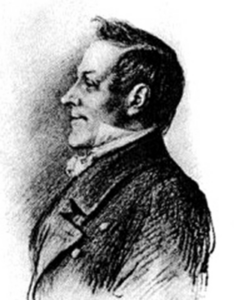On the way back
(Poet's title: Rückweg)
Set by Schubert:
D 476
[September 1816]
Zum Donaustrom, zur Kaiserstadt
Geh’ ich in Bangigkeit,
Denn was das Leben Schönes hat,
Entweichet weit und weit.
Die Berge schwinden allgemach,
Mit ihnen Wald und Fluss,
Der Kühe Glocken läuten nach,
Und Hütten nicken Gruß.
Was starrt dein Auge tränenfeucht
Hinaus in blaue Fern’?
Ach, dorten weilt´ ich unerreicht,
Frei unter Freien gern.
Wo Liebe noch und Treue gilt,
Da öffnet sich das Herz;
Die Frucht an ihren Strahlen schwillt
Und strebet himmelwärts.
Towards the river Danube, to the Imperial city,
I go in trepidation:
For what life has that is beautiful
Is becoming increasingly remote.
The mountains are gradually disappearing
And with them forests and rivers;
The cowbells reverberate,
And huts nod their heads as a greeting.
Your eyes, wet with tears, what are they staring
Up at in the blue yonder?
Oh, that is where I used to spend time, unreachable,
Happily free amongst the free!
Where love and faithfulness are still valued
The heart opens up;
The fruit swells up under their beams
And strives towards heaven.
All translations into English that appear on this website, unless otherwise stated, are by Malcolm Wren. You are free to use them on condition that you acknowledge Malcolm Wren as the translator and schubertsong.uk as the source. Unless otherwise stated, the comments and essays that appear after the texts and translations are by Malcolm Wren and are © Copyright.
☙
Themes and images in this text:
Bells Blue Cows Echo Eyes Fruit Greetings Hearts Heaven, the sky Hills and mountains Huts Journeys Kings and Emperors Mountains and cliffs Named rivers Rays of light Rivers (Fluß) Rivers (Strom) Towns Woods – large woods and forests (Wald)
‘Stadtluft macht frei’ (‘City air makes you free’) no longer applies. Mayrhofer dreads his return to the Imperial city of Vienna, where he feels enslaved. He therefore inverts the traditional saying, based on the understanding that serfs escaping from oppressive masters in the countryside could attain their legal freedom after residence for a year and a day in one of the towns of the Holy Roman Empire. He sees himself as a serf working for (and complicit in) the new Imperial system (run by Metternich). He has taken a break in the mountains south of the city, but now has to leave the world of nature and the open skies, which symbolise ‘all that is beautiful in life’ and make his way back to drudgery and servitude.
He recalls a stage of his life when he was able to spend more time out there, living a free, authentic life. One of the attractions of the hills was that he was ‘unerreicht’, ‘unreachable’, there (just as medieval serfs became ‘unreachable’ by their overlords once within the walls of a town). As the poet sees it, things have now changed; we only manage to be ‘out of contact’ when we are away from ‘civilization’. It is only when we get away from the corruption of the city that true love and integrity are possible.
The text occupies the middle ground between the wild mountains and open skies of Absolute Freedom and the oppression of Absolutist Tyranny. The landscape the poet is passing through is not totally uninhabited. There are huts (presumably used by shepherds and cowherds). There are cow-bells, reminding us that the cows grazing here are providing milk and cheese for the inhabitants of Vienna. The rivers (Fluß) that are receding must themselves flow into that mighty stream, the Danube (Donaustrom). Yet the poet cannot bring himself to see the connections. We recall Mayrhofer’s later struggles with depression and the fact that he tried to commit suicide by jumping into the river in Vienna on 23rd August 1828. He clearly never overcame his anxiety about returning to the river Danube.
☙
Original Spelling and notes on the text It is impossible to know if the differences between the text set by Schubert and that published in Mayrhofer's collected works (1824) are a result of Schubert changing the words or working from an earlier unpublished draft of the poem. Rückweg Zum Donaustrom, zur Kaiserstadt Geh' ich in Bangigkeit: Denn was das Leben Schönes hat, Entweichet1 weit und weit. Die Berge schwinden2 allgemach, Mit ihnen Wald3 und Fluß; Der Kühe Glocken läuten nach, Und Hütten nicken Gruß. Was starrt dein Auge thränenfeucht Hinaus in blaue Fern'? Ach, dorten weilt ich, unerreicht, Frey unter Freyen gern! Wo Liebe noch und Treue gilt, Da öffnet sich das Herz; Die Frucht an ihren Strahlen schwillt, Und strebet Himmelwärts. 1 This is the wording in Schubert's setting. In Mayrhofer's published text (1824) this is 'Entschwindet' (is fading away) 2 'weichen' (are retreating) in the published text 3 'Thal' (valleys) in the published text
Confirmed by Peter Rastl with Gedichte von Johann Mayrhofer. Wien. Bey Friedrich Volke. 1824, page 24.
To see an early edition of the text, go to page 24 [38 von 212] here: http://digital.onb.ac.at/OnbViewer/viewer.faces?doc=ABO_%2BZ177450902


